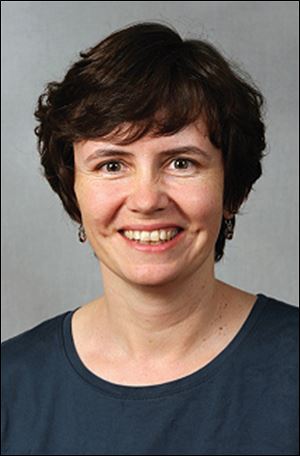
Bowling Green State University
7/24/2009
Bowling Green State University researcher, Dr. Catherine Kenney, examines a mother s impact on a father s role in childrearing.
It might seem like equally shared parenting would be a more commonly occurring phenomenon in the 21st century, but even for modern moms and dads, it s not so simple.
In research conducted with graduate assistant Ryan Bogle, Dr. Catherine Kenney, sociology, found that mothers had pretty broad acceptance of fathers playing with kids but some resistance to dads involvement in educational and caregiving activities moms more traditional domains.
Featured in a USA Today story May 5, the study of how mothers beliefs affect fathers involvement further found that a father spends less time involved with his child if the mother believes it s important for husbands to make important household decisions. The same thing is true if the mother doesn t trust the father, Kenney said. But fathers who believe that direct child care is their most important role do more with their children, she added.
Her interest in how people make equally shared parenting work led Kenney to look at how they divide parenting responsibilities. Gender beliefs are among the factors that can help predict, along with incomes and work hours, what proportion of the duties are done by fathers, she said.
She and Bogle began the research last summer using data from the ongoing Fragile Families and Child Wellbeing Study, which was launched in the 1990s by faculty at Columbia and Princeton universities, including Dr. Sara McLanahan, Kenney s graduate advisor at Princeton.
Encompassing just under 5,000 families in 20 large U.S. cities, the study has followed them beginning with a child s birth and through subsequent interviews when the child was ages 1, 3 and 5.
What makes it unique is the large number of unmarried parents involved, Kenney noted, pointing out that three quarters of the mothers weren t married when their children were born. That s a population we haven t known as much about, she said, explaining that previous similar studies have been primarily of smaller, more convenient (middle class, married) samples. This gives us a better view of what s going on across a broader swath of the population, she added.
Also, unlike prior research that was based on mothers reports about fathers behavior, the Fragile Families study has interviewed fathers, Kenney said. She and Bogle applied information gleaned from parents expressed beliefs and attitudes about gender roles and fathers involvement to what the dads were actually doing when their children were 5.
Mothers may more likely be gatekeepers when it comes to reading and other educational activities with their children because society still tends to think that moms have the real responsibility for making sure things get done, Kenney suggested.
In addition, she said, with many women not respected for much that they do, asking a person to step back from part of her life she does get respect for, without offering her anything else, is a lot to ask of somebody. Use of the term gatekeeper sometimes implies that mothers are meanies who won t let fathers get involved with their children, she continued, but maybe they hang onto certain kinds of caregiving because they re not getting rewards in other parts of life.
At the same time, Kenney acknowledged, men can give up possible promotions and other opportunities at work when they commit to equally shared parenting. When parents decide to do things equally, it can have costs on both sides, she said.
The next steps for the research, she said, include study of how equally shared parenting plays out in other groups in the population and its effects on children and marriages.
For now, the current study indicates some fathers may still be left out of a significant portion of their children s care and upbringing, but research such as this will lead to a greater understanding of how parents can learn to celebrate childrearing as a partnership that benefits all: mother, father and child.